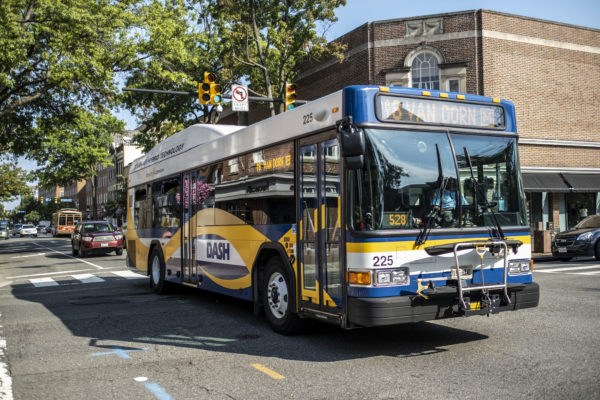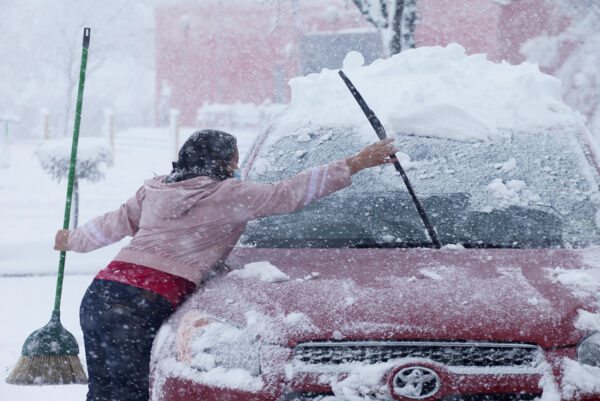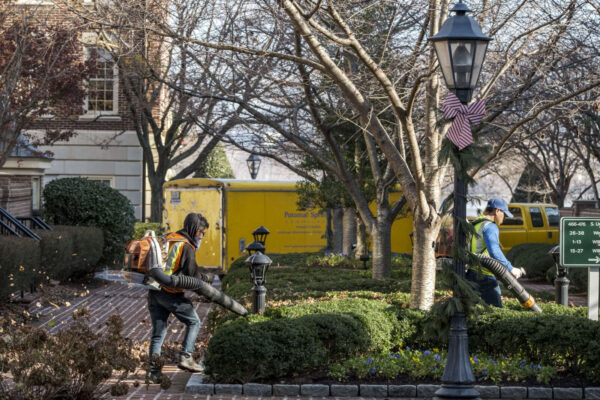DASH has been on a roll recently with a variety of factors conspiring to push the bus service up to 300,000 total boardings in March, a 73% increase over ridership last fall.
Some of that’s thanks to changes within the DASH bus system: like eliminating fares and shifting toward a system that prioritizes frequent service in high-density corridors.
Some factors outside of DASH’s control have been windfalls for bus ridership as well, like a recent spike in gas prices at the start of the war in Ukraine and declining Covid cases.
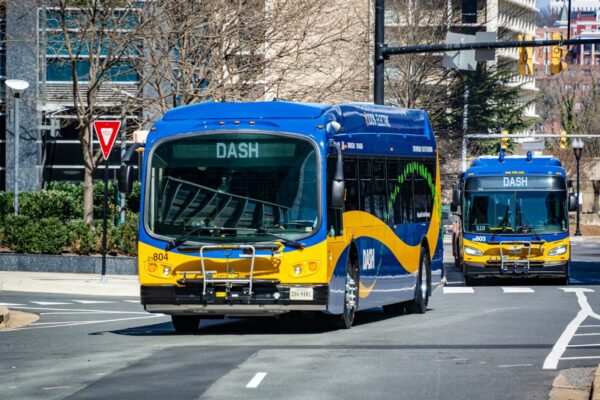
The Alexandria bus system has seen a significant uptick in ridership over the last few months, thanks in part to the new fare-free policy, changes to the DASH network and declining Covid numbers.
DASH said ridership hit nearly 300,000 total boardings in March, a 73% increase over ridership in August before the change to the new network. Ridership dipped significantly in January during the Omicron variant.
“In the first four months after the new network launch in September 2021, DASH saw a 50% increase in monthly boardings, which was the largest four-month ridership surge in over a decade,” the bus system said in a release. “After briefly receding in January and February due to the Omicron variant, ridership spiked again in March with a nearly 46% increase over February. DASH has now achieved 95% of pre-COVID ridership levels. The 73% increase from August 2021 to March 2022 marks the largest ridership increase over a seven-month span in recent DASH history.”
DASH said the largest ridership increases have been middays and weekends, in part due to the changes to the bus schedule. The new schedule provides more off-peak service in the West End, Arlandria and along King Street. The release also noted that higher gas prices may have been a windfall for bus ridership.
The city announced plans to make DASH fare free last April and the change went into effect in September. The city has pursued state funding to help make the change long-term.
“We are absolutely thrilled to see that the Alexandria community is embracing the first phase of our long-term Alexandria Transit Vision (ATV) Plan,” said DASH General Manager/CEO Josh Baker in the release. “Our shared goal with the City of Alexandria in implementing the ATV Plan is to provide more useful bus service that makes transit a more relevant option for more trips in Alexandria. As we continue to get more people on the bus, the entire Alexandria community benefits from less traffic congestion, reduced parking demand, reduced climate impact, and a better overall quality of life.”
Photo via DASH/Facebook
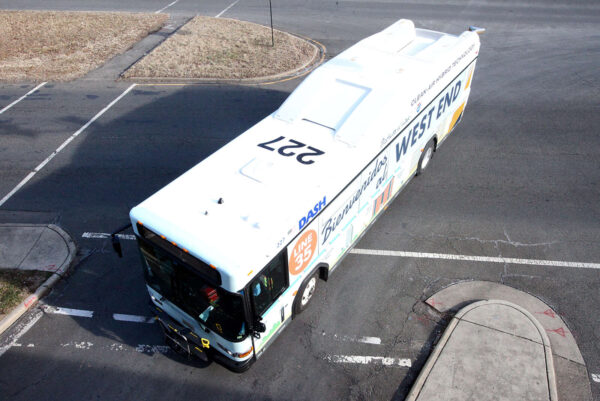
The Landmark Mall Transit Center will be closed for about a week starting tomorrow (Tuesday) for construction as the facility serving DASH and Metrobus is relocated ahead of the mall’s demolition this spring.
DASH sent out a notice that the transit center would close Tuesday, March 29, for about one week, meaning DASH Line 30, 32 and 35 buses will not stop at Landmark Mall. It wasn’t yet known whether the transit center will reopen at the relocated spot in front of the former Macy’s, or if that relocation would happen at a later date.
Landmark Mall will be demolished ahead of Inova’s construction of a new hospital campus. Inova recently filed concept plans with the city, showing the campus will include a new Level 2 trauma hospital, a cancer center and a specialty care center.
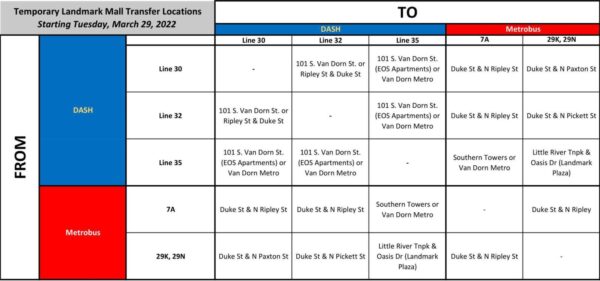
Alexandria’s DASH bus service is headed back to regular service after the omicron surge of COVID-19 forced the bus system to operate with a reduced schedule.
DASH scaled back its weekday bus service in December, with many lines operating on the reduced weekend hours and frequency.
“All DASH buses will resume regular weekday service beginning Monday, Feb. 28,” the service said in a press release. “The Alexandria Transit Company, which operates the DASH bus system, temporarily adjusted service schedules in January due to COVID-19 related staffing shortages.”
While DASH has recovered enough to resume normal service, the release did say that DASH continues to face a shortage of transit workers and bus operators and will continue monitoring ridership and staffing to make changes as needed.
Despite the omicron-related hurdle, DASH ridership has gradually been climbing back to pre-pandemic levels.
“We are excited to resume regular weekday service because it provides greater bus frequency to Alexandria,” said DASH General Manager/CEO Josh Baker. “Thank you to our riders and our community for weathering these challenges with us.”

If the city wants a fully electrical bus fleet, DASH leadership said its going to need to invest in making sure buses can recharge across the city.
In a meeting with the City Council ahead of the legislative session last night, DASH General Manager Josh Baker outlined some challenges facing the city as it pushes to have a fully electric bus fleet by 2035.
The city is already laying the groundwork for some of the infrastructure needs. DASH is currently undergoing an expansion that will add a new electric bus lot. There are other areas, though, where Baker said the city’s needs are outpacing technological limits.
“The technology is very new so we’re very much a pioneer on the implementation of this,” Baker said.
Some of the challenges to the electric bus fleet were already noted in earlier reports. Cold weather, for instance, can cause the batteries to drain more quickly because power is being redirected to heat. Other reports noted that electric buses can sometimes struggle with hills.
One of the larger issues, Baker said, is that electric buses will need to charge while traveling the city in-service rather than needing to come back to DASH headquarters.
“We need to see the technology continue to catch up to address charging infrastructure and we’re looking for ways to have equipment that can charge buses en route rather than bring them back to the facility, charge for several hours, and sent back out on service,” Baker said. “That’s what we need to figure out to have a fully electric fleet that’s sustainable.”
Baker also said that cost is currently an issue, with electric buses costing nearly twice as much as standard diesel buses.
“An electric bus costs several hundred thousand dollars more per unit than a standard diesel bus counterpart,” Baker said. “[It’s] $575,000 for a diesel and around $900,000 for electric.”
But Baker said as there’s more production and nationwide implementation of electric buses, that could change.
“Those numbers are coming down and we believe implementation across the country will help that, but it is early on,” Baker said. “We need to see the technology catch up.”
Photo via DASH/Facebook
A male juvenile was assaulted twice on a DASH bus in December, according to Alexandria Police.
On Dec. 7, the victim reported to police that he was assaulted by an individual and then by a mob. It is not clear where the bus was when the victim was assaulted.
The victim told police that he was assaulted by a male on a DASH bus and that the same suspect stole his bookbag. A few minutes later, he was assaulted by multiple males who also robbed him of his phone.
Videos of the incident were later uploaded to a private Instagram account with an Alexandria City High School logo as its profile picture.
This is the second known instance of fights and other violent behavior involving Alexandria students being uploaded to Instagram. Last year, a bunch of student fights were recorded at George Washington Middle School and put on the platform.
No arrests have been made and the incident remains under investigation, according to police.

DASH ridership has been working its way back up toward pre-pandemic levels after a nasty slump caused by COVID-19.
In a monthly newsletter, Alexandria Mayor Justin Wilson shared some figures for DASH ridership from the months after the city’s new fare-free program and route adjustment was put into place.
- In October, DASH experienced 256,000 systemwide boardings. This was the highest single month since February of 2020.
- Total DASH ridership increased by 50% between August and October.
- Our October ridership represents about 72% of pre-pandemic ridership.
- West End ridership presently exceeds pre-pandemic volume.
The bus service has hit a few bumps recently. DASH services have also been temporarily scaled back due to a bus operator shortage caused by the widespread omicron variant of COVID-19. Separately, DASH is also working on implementing electric buses, but has found that the buses have difficulty with uneven terrain and have unreliable chargers.
The city is also seeking state funding to make the fare-free program long-term.
“This is an important step forward as we create a transit system that serves more of our community with more efficient and relevant service,” Wilson said. “So far, it looks like it’s working.”
Photo via DASH/Facebook
One day after a severe snowstorm hit Alexandria, some things are returning to normal while other services remain closed.
Alexandria bus service DASH suspended service yesterday, but has since returned with snow routes — adjusted routes following more thoroughly cleared sections of roadway.
https://twitter.com/DASHBus/status/1478381102976978948
City facilities had a delayed reopening at 10 a.m. today with local courts remaining closed. Alexandria libraries scheduled to open at 10 a.m. will instead be opening at noon to give staff time to clear off the sidewalks. The Animal Welfare League of Alexandria is open by-appointment starting at noon.
The AWLA will open BY APPOINTMENT today at noon. If you have any wildlife concerns or animal emergencies, please call 703.746.4444. Thank you! pic.twitter.com/C6C3kskjsA
— AWLA Alexandria (@AlexAnimals) January 4, 2022
Alexandria City Public Schools has moved to virtual schooling for the second day in a row.
Those who set their trash, recycling, yard waste or leaf collection out today may have already discovered this, but the Monday collection has slid to Wednesday, Jan. 5., with every day offset by two after that.
Meanwhile, the city said in a press release that road and sidewalk clearing is still underway and property owners should be clearing sidewalks.
“Roads are plowed by priority,” the city said. “Snow emergency routes are plowed first, followed by secondary routes, intermediate routes, and then residential streets… Clearing sidewalks, driveways, and entrances is the responsibility of the adjacent property owner, occupant, community association, or business. The recent storm event has been declared Level 2. As a result, responsible parties have 48 hours from the end of snowfall at 2 p.m. on Monday, January 3 to clear paths. The deadline for clearing paths and walkways is Wednesday, January 5, at 2 p.m.”
Local restaurants to require vaccination proof in January — “At least a few restaurants are asking diners to provide proof of COVID-19 vaccination before dining indoors.” [Alexandria Living Magazine]
COVID-19 cases more than doubled in past week — “Cases of COVID-19 in Alexandria more than doubled in the seven days ending on Tuesday, apparently fueled by the highly contagious Omicron variant combined with indoor holiday gatherings.” [Alexandria Times]
DASH adjusts service due to COVID-19 — “DASH is facing a shortage of workers, including bus drivers and mechanics, due to coronavirus.” [Alexandria Living Magazine]
Alexandria plans pilgrimage to Montgomery, Ala., to honor its lynching victims — “A national memorial in Montgomery, Ala., has been honoring the victims of lynching since 2018. Now, the city of Alexandria, Va., is planning a pilgrimage to Montgomery to recognize its place in that history, and the public is invited.” [Washington Post]
Partnership to benefit Mount Vernon Trail — “National Landing Business Improvement District has teamed up with the Friends of Mount Vernon Trail to help preserve 18-mile trail.” [Alexandria Living Magazine]

Alexandria bus network DASH has been charging ahead on its electric bus program, but DASH leadership said the initiative has also faced a few bumps in the road.
At a meeting of the Northern Virginia Transportation Commission last week, DASH General Manager Josh Baker shared some of the city bus service’s experience with implementing electrical buses.
“At DASH, we are endeavoring to have a fully zero-emissions fleet by 2025 with phase-out of diesel and hybrid buses by 2027,” Baker said. “The 2025 benchmark is to understand that buses have a minimum 12-year duty cycle.”
While Baker said that electric buses are a big short-term investment — approximately $5.1 million for six battery-electric transit buses and fast chargers — the idea is that electric buses will counter-balance that with long-term benefits to maintenance and fuel costs. So far, Baker said that’s been borne out by electric buses requiring half maintenance cost compared to diesel counterparts, though it’s worth noting that the electric buses are also newer than the diesel buses.
“We’ve been operating electrical buses for over a year,” Baker said. “They were first implemented in October last year. We’ve seen some success, and they’ve been well received by the community and riders.”
Baker also admitted that the electric buses have some challenges, specifically that “they don’t love hills and they don’t love highways, which is something to keep in mind as the program moves forward.”
Baker said the biggest problem, though, has been with the bus chargers.
“The biggest issue we’ve had has been with charging,” Baker said. “As long as they’re charged they’re out there running, but chargers have a tendency to go down for various reasons. We’ve had troubles with installation and contractors and getting them serviced when they break down.”
As winter starts to approach, Baker said the other issue is heating on the buses. Baker said that the electric buses don’t have an engine to generate the same levels of heat that diesel buses do.
“If you’re generating heat from the battery, up to 60% of that can go into heating,” Baker said.
As technology advances, Baker said the heating system in electric buses are likely one of the things that will change over the next few years.
Photo via DASH/Facebook


